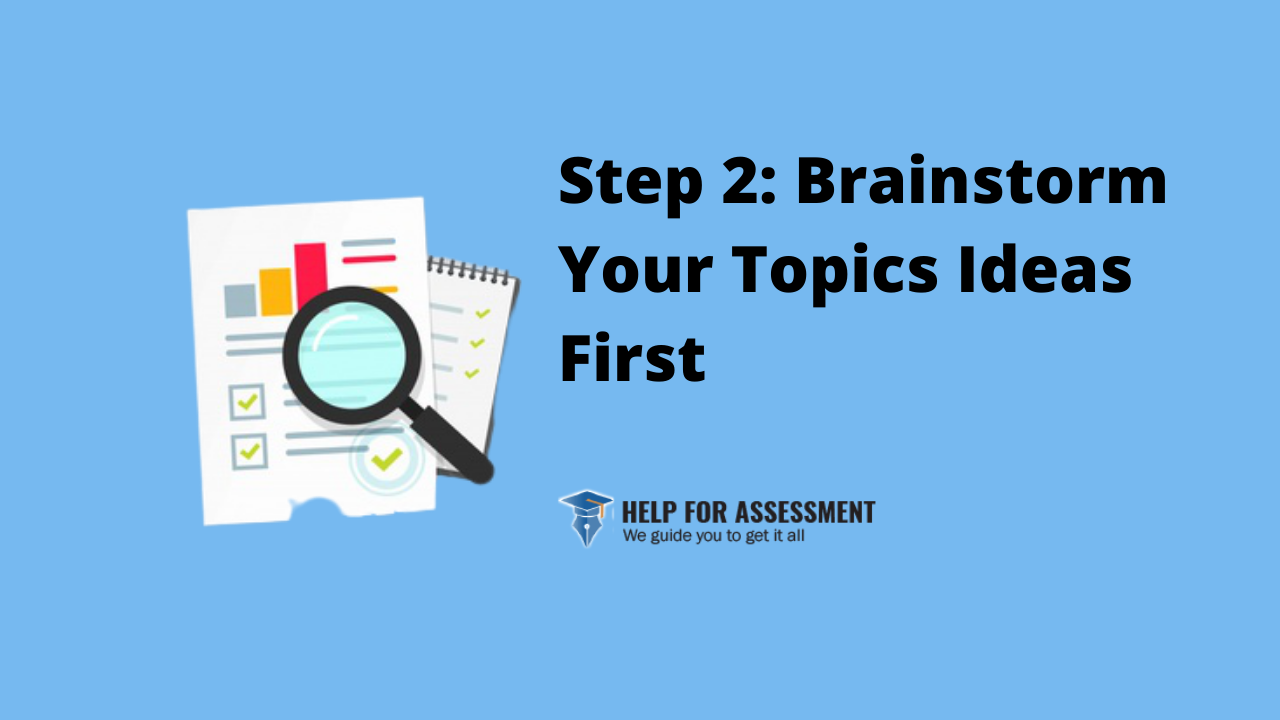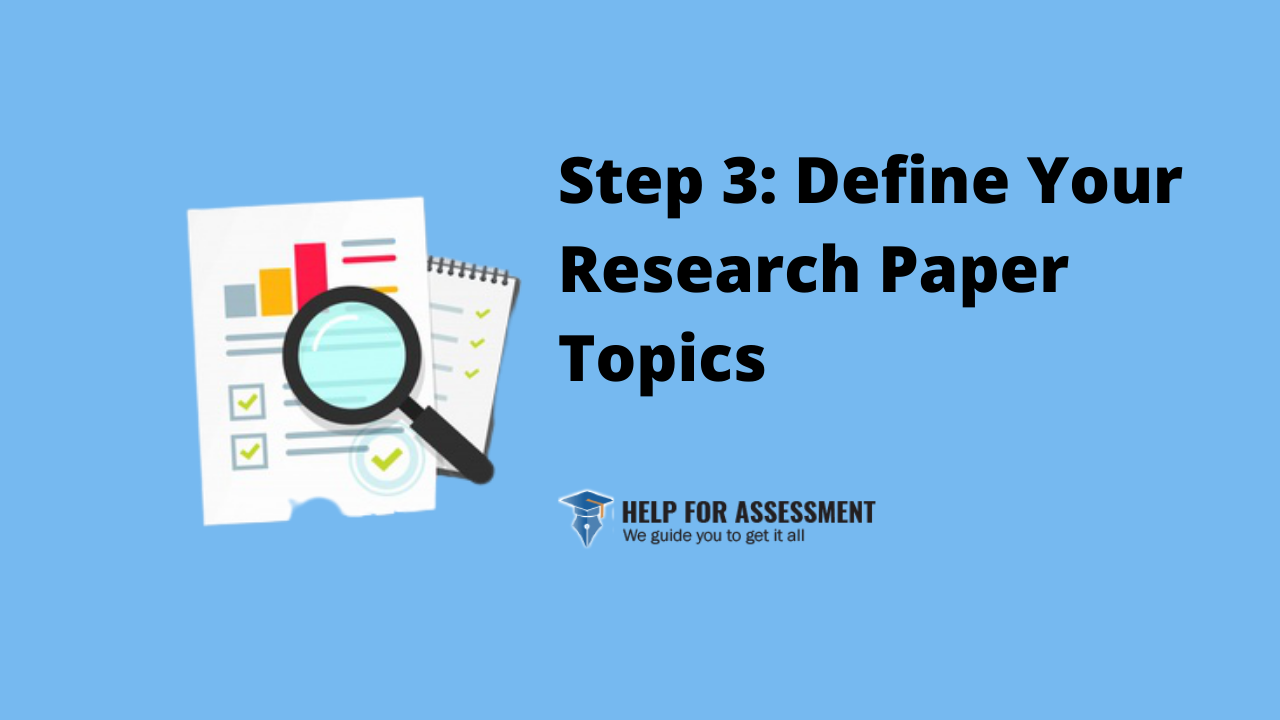
- Customer Reviews
- Extended Essays
- IB Internal Assessment
- Theory of Knowledge
- Literature Review
- Dissertations
- Essay Writing
- Research Writing
- Capstone Projects
- College Application
- Online Class

How to Select a Research Topic: A Step-by-Step Guide
0 Comments
by Antony W
June 6, 2024

Learning how to select a research topic can be the difference between failing your assignment and writing a comprehensive research paper. That’s why in this guide we’ll teach you how to select a research topic step-by-step.
You don’t need this guide if your professor has already given you a list of topics to consider for your assignment . You can skip to our guide on how to write a research paper .
If they have left it up to you to choose a topic to investigate, which they must approve before you start working on your research study, we suggest that you read the process shared in this post.
Choosing a topic after finding your research problem is important because:
- The topic guides your research and gives you a mean to not only arrive at other interesting topics but also direct you to discover new knowledge
- The topic you choose will govern what you say and ensures you keep a logical flow of information.
Picking a topic for a research paper can be challenging and sometimes intimidating, but it’s not impossible. In the following section, we show you how to choose the best research topic that your instructor can approve after the first review.
How to Select a Research Topic
Below are four steps to follow to find the most suitable topic for your research paper assignment:
Step 1: Consider a Topic that Interests You

If your professor has asked you to choose a topic for your research paper, it means you can choose just about any subject to focus on in your area of study. A significant first step to take is to consider topics that interest you.
An interesting topic should meet two very important conditions.
First, it should be concise. The topic you choose should not be too broad or two narrow. Rather, it should be something focused on a specific issue. Second, the topic should allow you to find enough sources to cite in the research stage of your assignment.
The best way to determine if the research topic is interesting is to do some free writing for about 10 minutes. As you free write, think about the number of questions that people ask about the topic and try to consider why they’re important. These questions are important because they will make the research stage easier for you.
You’ll probably have a long list of interesting topics to consider for your research assignment. That’s a good first step because it means your options aren’t limited. However, you need to narrow down to only one topic for the assignment, so it’s time to start brainstorming.
Step 2: Brainstorm Your Topics

You aren’t doing research at this stage yet. You are only trying to make considerations to determine which topic will suit your research assignment.
The brainstorming stage isn’t difficult at all. It should take only a couple of hours or a few days depending on how you approach.
We recommend talking to your professor, classmates, and friends about the topics that you’ve picked and ask for their opinion. Expect mixed opinions from this audience and then consider the topics that make the most sense. Note what topics picked their interest the most and put them on top of the list.
You’ll end up removing some topics from your initial list after brainstorming, and that’s completely fine. The goal here is to end up with a topic that interests you as well as your readers.
Step 3: Define Your Topics

Check once again to make sure that your topic is a subject that you can easily define. You want to make sure the topic isn’t too broad or too narrow.
Often, a broad topic presents overwhelming amount of information, which makes it difficult to write a comprehensive research paper. A narrow topic, on the other hand, means you’ll find very little information, and therefore it can be difficult to do your assignment.
The length of the research paper, as stated in the assignment brief, should guide your topic selection.
Narrow down your list to topics that are:
- Broad enough to allows you to find enough scholarly articles and journals for reference
- Narrow enough to fit within the expected word count and the scope of the research
Topics that meet these two conditions should be easy to work on as they easily fit within the constraints of the research assignment.
Step 4: Read Background Information of Selected Topics

You probably have two or three topics by the time you get to this step. Now it’s time to read the background information on the topics to decide which topic to work on.
This step is important because it gives you a clear overview of the topic, enabling you to see how it relates to broader, narrower, and related concepts. Preliminary research also helps you to find keywords commonly used to describe the topic, which may be useful in further research.
It’s important to note how easy or difficult it is to find information on the topic.
Look at different sources of information to be sure you can find enough references for the topic. Such periodic indexes scan journals, newspaper articles, and magazines to find the information you’re looking for. You can even use web search engines. Google and Bing are currently that best options to consider because they make it easy for searchers to find relevant information on scholarly topics.
If you’re having a hard time to find references for a topic that you’ve so far considered for your research paper, skip it and go to the next one. Doing so will go a long way to ensure you have the right topic to work on from start to finish.
Get Research Paper Writing Help
If you’ve found your research topic but you feel so stuck that you can’t proceed with the assignment without some assistance, we are here to help. With our research paper writing service , we can help you handle the assignment within the shortest time possible.
We will research your topic, develop a research question, outline the project, and help you with writing. We also get you involved in the process, allowing you to track the progress of your order until the delivery stage.
About the author
Antony W is a professional writer and coach at Help for Assessment. He spends countless hours every day researching and writing great content filled with expert advice on how to write engaging essays, research papers, and assignments.
Purdue Online Writing Lab College of Liberal Arts
Choosing a Topic

Welcome to the Purdue OWL
This page is brought to you by the OWL at Purdue University. When printing this page, you must include the entire legal notice.
Copyright ©1995-2018 by The Writing Lab & The OWL at Purdue and Purdue University. All rights reserved. This material may not be published, reproduced, broadcast, rewritten, or redistributed without permission. Use of this site constitutes acceptance of our terms and conditions of fair use.
The first step of any research paper is for the student to understand the assignment. If this is not done, the student will often travel down many dead-end roads, wasting a great deal of time along the way. Do not hesitate to approach the instructor with questions if there is any confusion. A clear understanding of the assignment will allow you to focus on other aspects of the process, such as choosing a topic and identifying your audience.
A student will often encounter one of two situations when it comes to choosing a topic for a research paper. The first situation occurs when the instructor provides a list of topics from which the student may choose. These topics have been deemed worthy by the instructor; therefore, the student should be confident in the topic he chooses from the list. Many first-time researchers appreciate such an arrangement by the instructor because it eliminates the stress of having to decide upon a topic on their own.
However, the student may also find the topics that have been provided to be limiting; moreover, it is not uncommon for the student to have a topic in mind that does not fit with any of those provided. If this is the case, it is always beneficial to approach the instructor with one's ideas. Be respectful, and ask the instructor if the topic you have in mind would be a possible research option for the assignment. Remember, as a first-time researcher, your knowledge of the process is quite limited; the instructor is experienced, and may have very precise reasons for choosing the topics she has offered to the class. Trust that she has the best interests of the class in mind. If she likes the topic, great! If not, do not take it personally and choose the topic from the list that seems most interesting to you.
The second situation occurs when the instructor simply hands out an assignment sheet that covers the logistics of the research paper, but leaves the choice of topic up to the student. Typically, assignments in which students are given the opportunity to choose the topic require the topic to be relevant to some aspect of the course; so, keep this in mind as you begin a course in which you know there will be a research paper near the end. That way, you can be on the lookout for a topic that may interest you. Do not be anxious on account of a perceived lack of authority or knowledge about the topic chosen. Instead, realize that it takes practice to become an experienced researcher in any field.
For a discussion of Evaluating Sources, see Evaluating Sources of Information .
Methods for choosing a topic
Thinking early leads to starting early. If the student begins thinking about possible topics when the assignment is given, she has already begun the arduous, yet rewarding, task of planning and organization. Once she has made the assignment a priority in her mind, she may begin to have ideas throughout the day. Brainstorming is often a successful way for students to get some of these ideas down on paper. Seeing one's ideas in writing is often an impetus for the writing process. Though brainstorming is particularly effective when a topic has been chosen, it can also benefit the student who is unable to narrow a topic. It consists of a timed writing session during which the student jots down—often in list or bulleted form—any ideas that come to his mind. At the end of the timed period, the student will peruse his list for patterns of consistency. If it appears that something seems to be standing out in his mind more than others, it may be wise to pursue this as a topic possibility.
It is important for the student to keep in mind that an initial topic that you come up with may not be the exact topic about which you end up writing. Research topics are often fluid, and dictated more by the student's ongoing research than by the original chosen topic. Such fluidity is common in research, and should be embraced as one of its many characteristics.
The Purdue OWL also offers a number of other resources on choosing and developing a topic:
- Understanding Writing Assignments
- Starting the Writing Process
- Invention Slide Presentation
Selecting a Research Topic: Overview
- Refine your topic
- Background information & facts
- Writing help
Here are some resources to refer to when selecting a topic and preparing to write a paper:
- MIT Writing and Communication Center "Providing free professional advice about all types of writing and speaking to all members of the MIT community."
- Search Our Collections Find books about writing. Search by subject for: english language grammar; report writing handbooks; technical writing handbooks
- Blue Book of Grammar and Punctuation Online version of the book that provides examples and tips on grammar, punctuation, capitalization, and other writing rules.
- Select a topic
Choosing an interesting research topic is your first challenge. Here are some tips:
- Choose a topic that you are interested in! The research process is more relevant if you care about your topic.
- If your topic is too broad, you will find too much information and not be able to focus.
- Background reading can help you choose and limit the scope of your topic.
- Review the guidelines on topic selection outlined in your assignment. Ask your professor or TA for suggestions.
- Refer to lecture notes and required texts to refresh your knowledge of the course and assignment.
- Talk about research ideas with a friend. S/he may be able to help focus your topic by discussing issues that didn't occur to you at first.
- WHY did you choose the topic? What interests you about it? Do you have an opinion about the issues involved?
- WHO are the information providers on this topic? Who might publish information about it? Who is affected by the topic? Do you know of organizations or institutions affiliated with the topic?
- WHAT are the major questions for this topic? Is there a debate about the topic? Are there a range of issues and viewpoints to consider?
- WHERE is your topic important: at the local, national or international level? Are there specific places affected by the topic?
- WHEN is/was your topic important? Is it a current event or an historical issue? Do you want to compare your topic by time periods?
Table of contents
- Broaden your topic
- Information Navigator home
- Sources for facts - general
- Sources for facts - specific subjects
Start here for help
Ask Us Ask a question, make an appointment, give feedback, or visit us.
- Next: Refine your topic >>
- Last Updated: Jul 30, 2021 2:50 PM
- URL: https://libguides.mit.edu/select-topic
- SPECIAL COLLECTIONS
- COVID-19 Library Updates
- Make Appointment
Research 101 (A How-to Guide): Step 1. Choose a topic
- Step 1. Choose a topic
- Step 2. Get background information
- Step 3. Create a search strategy
- Step 4. Find books and e-books
- Step 5. Find articles
- Step 6. Evaluate your sources
- Step 7. Cite your sources
Step 1. Choose a Topic
Choosing an interesting research topic can be challenging. This video tutorial will help you select and properly scope your topic by employing questioning, free writing, and mind mapping techniques so that you can formulate a research question.
Good Sources for Finding a Topic
- CQ Researcher This link opens in a new window Browse the "hot topics" on the right hand side for inspiration.
- 401 Prompts for Argumentative Writing, New York Times Great questions to consider for argumentative essays.
- ProCon.org Facts, news, and thousands of diverse opinions on controversial issues in a pro-con format.
- Room For Debate, New York Times This website, created by editorial staff from the New York Times, explores close to 1,500 news events and other timely issues. Knowledgeable outside contributors provide subject background and readers may contribute their own views. Great help for choosing a topic!
- US News & World Report: Debate Club Pro/Con arguments on current issues.
- Writing Prompts, New York Times New York Times Opinion articles that are geared toward students and invite comment.
Tips for Choosing a Topic
- Choose a topic that interests you!
- Pick a manageable topic, not too broad, not too narrow. Reading background info can help you choose and limit the scope of your topic.
- Review lecture notes and class readings for ideas.
- Check with your instructor to make sure your topic fits with the assignment.
Picking your topic IS research!
- Developing a Research Question Worksheet
Mind Mapping Tools
Mind mapping, a visual form of brainstorming, is an effective technique for developing a topic. Here are some free tools to create mind maps.
- Bubbl.us Free account allows you to save 3 mind maps, download as image or HTML, and share with others.
- Coggle Sign in with your Google account to create maps that you can download as PDF or PNG or share with others.
- << Previous: Overview
- Next: Step 2. Get background information >>
- Last Updated: Dec 17, 2024 9:22 AM
- URL: https://libguides.depaul.edu/research101

🚀 Work With Us
Private Coaching
Language Editing
Qualitative Coding
✨ Free Resources
Templates & Tools
Short Courses
Articles & Videos
How To Choose A Research Topic
By: Derek Jansen (MBA) | Expert Reviewer: Dr Eunice Rautenbach | April 2024

Overview: The “Big 5” Key Criteria
- Topic originality or novelty
- Value and significance
- Access to data and equipment
- Time limitations and implications
- Ethical requirements and constraints
Criterion #1: Originality & Novelty
As we’ve discussed extensively on this blog, originality in a research topic is essential. In other words, you need a clear research gap . The uniqueness of your topic determines its contribution to the field and its potential to stand out in the academic community. So, for each of your prospective topics, ask yourself the following questions:
- What research gap and research problem am I filling?
- Does my topic offer new insights?
- Am I combining existing ideas in a unique way?
- Am I taking a unique methodological approach?
To objectively evaluate the originality of each of your topic candidates, rate them on these aspects. This process will not only help in choosing a topic that stands out, but also one that can capture the interest of your audience and possibly contribute significantly to the field of study – which brings us to our next criterion.

Criterion #2: Value & Significance
Next, you’ll need to assess the value and significance of each prospective topic. To do this, you’ll need to ask some hard questions.
- Why is it important to explore these research questions?
- Who stands to benefit from this study?
- How will they benefit, specifically?
By clearly understanding and outlining the significance of each potential topic, you’ll not only be justifying your final choice – you’ll essentially be laying the groundwork for a persuasive research proposal , which is equally important.
Criterion #3: Access to Data & Equipment
Naturally, access to relevant data and equipment is crucial for the success of your research project. So, for each of your prospective topic ideas, you’ll need to evaluate whether you have the necessary resources to collect data and conduct your study.
Here are some questions to ask for each potential topic:
- Will I be able to access the sample of interest (e.g., people, animals, etc.)?
- Do I have (or can I get) access to the required equipment, at the time that I need it?
- Are there costs associated with any of this? If so, what are they?
Keep in mind that getting access to certain types of data may also require special permissions and legalities, especially if your topic involves vulnerable groups (patients, youths, etc.). You may also need to adhere to specific data protection laws, depending on the country. So, be sure to evaluate these aspects thoroughly for each topic. Overlooking any of these can lead to significant complications down the line.

Criterion #4: Time Requirements & Implications
Naturally, having a realistic timeline for each potential research idea is crucial. So, consider the scope of each potential topic and estimate how long each phase of the research will take — from literature review to data collection and analysis, to writing and revisions. Underestimating the time needed for a research project is extremely common , so it’s important to include buffer time for unforeseen delays.
Remember, efficient time management is not just about the duration but also about the timing . For example, if your research involves fieldwork, there may specific times of the year when this is most doable (or not doable at all). So, be sure to consider both time and timing for each of your prospective topics.
Criterion #5: Ethical Compliance
Failing to adhere to your university’s research ethics policy is a surefire way to get your proposal rejected . So, you’ll need to evaluate each topic for potential ethical issues, especially if your research involves human subjects, sensitive data, or has any potential environmental impact.
Remember that ethical compliance is not just a formality – it’s a responsibility to ensure the integrity and social responsibility of your research. Topics that pose significant ethical challenges are typically the first to be rejected, so you need to take this seriously. It’s also useful to keep in mind that some topics are more “ethically sensitive” than others , which usually means that they’ll require multiple levels of approval. Ideally, you want to avoid this additional admin, so mark down any prospective topics that fall into an ethical “grey zone”.
If you’re unsure about the details of your university’s ethics policy, ask for a copy or speak directly to your course coordinator. Don’t make any assumptions when it comes to research ethics!

Key Takeaways
In this post, we’ve explored how to choose a research topic using a systematic approach. To recap, the “Big 5” assessment criteria include:
- Topic originality and novelty
- Time requirements
- Ethical compliance
Be sure to grab a copy of our free research topic evaluator sheet here to fast-track your topic selection process. If you need hands-on help finding and refining a high-quality research topic for your dissertation or thesis, you can also check out our private coaching service .
Need a helping hand?
You Might Also Like:

How To Choose A Tutor For Your Dissertation
Hiring the right tutor for your dissertation or thesis can make the difference between passing and failing. Here’s what you need to consider.

5 Signs You Need A Dissertation Helper
Discover the 5 signs that suggest you need a dissertation helper to get unstuck, finish your degree and get your life back.

Writing A Dissertation While Working: A How-To Guide
Struggling to balance your dissertation with a full-time job and family? Learn practical strategies to achieve success.

How To Review & Understand Academic Literature Quickly
Learn how to fast-track your literature review by reading with intention and clarity. Dr E and Amy Murdock explain how.

Dissertation Writing Services: Far Worse Than You Think
Thinking about using a dissertation or thesis writing service? You might want to reconsider that move. Here’s what you need to know.
📄 FREE TEMPLATES
Research Topic Ideation
Proposal Writing
Literature Review
Methodology & Analysis
Academic Writing
Referencing & Citing
Apps, Tools & Tricks
The Grad Coach Podcast
i need guidance on the choise of research topic.
I need guidance on my research topic . Assessing the impacts of Tradition birth attendants in Safe motherhood
I need help on research proposal
Hello I need help on choice of research topic in field of finance
Submit a Comment Cancel reply
Your email address will not be published. Required fields are marked *
Save my name, email, and website in this browser for the next time I comment.
Submit Comment
- Print Friendly

How to Choose the Right Research Topic: Tips for Academic Success
Selecting the right research topic is one of the most crucial steps in any academic project. Whether you’re working on a thesis, dissertation, or a research paper, the topic you choose can significantly impact the quality and success of your work. A well-chosen topic not only keeps you motivated but also makes the research process smoother and more enjoyable. In this article, we’ll explore key strategies on how to choose the right research topic that will set you up for academic success.
1. Start with Your Interests and Passion
The first step in selecting a research topic is to focus on subjects you are genuinely interested in. If you are passionate about a topic, you are more likely to remain engaged throughout the research process. Passion will help you stay motivated, especially when the work becomes challenging.
Why it’s important: Choosing a topic that interests you makes the research process more enjoyable and reduces the risk of burnout.
Tip: Reflect on subjects you enjoy in your field of study. Consider personal experiences or events that sparked your curiosity.
2. Consider Relevance and Current Trends
It’s essential to select a topic that is relevant to your field of study and aligned with current trends and debates. Research that addresses contemporary issues or fills gaps in existing knowledge is more likely to be impactful. Stay up to date with recent publications, news, and advancements in your field to identify areas of growing interest.
Why it’s important: A timely and relevant topic enhances the significance of your research and increases its potential for academic contribution.
Tip: Use academic journals, databases, and conferences to identify trending topics and emerging areas of research in your discipline.
3. Narrow Down the Scope
Once you’ve chosen a general area of interest, it’s time to narrow down your topic. A well-defined topic is manageable and allows you to focus on specific research questions. Avoid overly broad topics that may overwhelm you with data or require a significant amount of time and resources to explore.
Get started with our 100,000+ topics in your field of study
Why it’s important: Focusing on a narrow, specific research question makes your study more targeted and feasible, ensuring that you can complete it within the required time frame.
Tip: Ask yourself: Can I realistically research this topic in the available time? Is it specific enough to be explored in depth?
4. Ensure There Is Sufficient Literature
Before finalizing your topic, make sure there is enough existing literature available to support your research. You will need access to relevant academic sources, such as books, articles, and reports, that provide a foundation for your study. Conduct a preliminary literature review to determine if there’s sufficient material for your research.
Why it’s important: A well-researched topic has ample resources to help you build your argument and analysis. Without enough literature, you may struggle to support your claims.
Tip: Use academic databases like JSTOR, Google Scholar, or PubMed to check for existing studies on your topic.
5. Define the Research Problem Clearly
Your research problem or question is the core of your study, and it should be clearly defined from the start. A focused research problem guides your methodology and shapes the direction of your entire project. A vague or overly broad problem can lead to confusion and difficulty in narrowing down your research.
Why it’s important: A clear research problem ensures your work is focused and provides a solid foundation for your study.
Tip: Make your research problem specific, measurable, and achievable within the scope of your project.
6. Consider Feasibility and Resources
When choosing your research topic, consider the resources you have available, such as time, budget, and access to data. Some topics may require specialized equipment, fieldwork, or access to specific populations that may not be feasible for your project. Evaluate whether you have the tools and resources necessary to carry out the research effectively.
Why it’s important: A feasible topic ensures that you can complete your research on time and with the resources at your disposal.
Tip: Plan ahead and assess the availability of resources before committing to a topic.
7. Seek Feedback from Advisors and Peers
It can be helpful to seek advice from your professors, academic advisors, or peers when selecting your research topic. They can provide valuable feedback, point out potential problems, or suggest new perspectives. Engaging with others can help refine your ideas and ensure that your topic is academically sound.
Why it’s important: Feedback from others helps to validate your topic and ensures you’re on the right track.
Tip: Don’t hesitate to discuss your research ideas with others to gain insight and ensure that your topic is both practical and academically rigorous.
Choosing the right research topic is essential to academic success. By selecting a topic that aligns with your interests, is relevant to current trends, and is feasible to research, you set the foundation for a successful academic project. Remember to narrow down your focus, ensure sufficient literature exists, and seek advice when needed. By following these tips, you’ll be well on your way to conducting meaningful and impactful research.
If you’re struggling to choose the right research topic, you can get started with our 100,000+ topics in your field of study or book a free consultation with our expert writers for more tips on academic writing and research success!
All rights reserved © 2024 • Powered by 99Scholar
WhatsApp us

Affiliate 💸
Get started free
Research Paper
How To Choose A Research Topic That You're Uniquely Qualified For
Discover expert tips on how to choose a research topic. Navigate the process seamlessly for a compelling and focused academic journey
Feb 19, 2024

Embarking on a research journey can be both exhilarating and daunting, especially when faced with the pivotal decision of selecting a research topic. The process of how to choose a research topic is a crucial step that sets the foundation for your entire academic pursuit. From exploring your passions to assessing the gap in existing literature, this blog will guide you through the intricate maze of research paper structure , offering insights to help you navigate the landscape of academic inquiry with confidence and clarity. Dive in and embark on the path to crafting a compelling research narrative that resonates with your scholarly pursuits.
Table of Contents
Criteria for choosing a research topic, find gaps in fields, supercharge your researching ability with otio — try otio for free today.

When embarking on the journey of selecting a research topic, several key criteria should be carefully considered to ensure a successful and enriching research experience.
Relevance and Significance
The chosen topic should be relevant to your field of study or interest, addressing current issues or gaps in existing literature. It should also be significant, contributing new insights or perspectives to the academic community.
Feasibility and Manageability
Consider the scope of the topic and ensure it is manageable within the constraints of time, resources, and available data. A feasible topic will allow you to conduct thorough research without overwhelming complexity.
Personal Interest and Passion
Select a topic that genuinely interests and excites you. Your enthusiasm for the subject will sustain your motivation throughout the research process and lead to a more engaging final output.
Originality and Uniqueness
Strive to choose a topic that is original and offers a unique angle or approach. Building on existing research is valuable, but adding a fresh perspective or innovative methodology can set your work apart.
Research Potential and Impact
Assess the potential for your research to make a meaningful impact within your field. Consider how your findings could contribute to theoretical frameworks, practical applications, or policy implications.
Let Otio Be Your AI Research and Writing Partner
Knowledge workers, researchers, and students can now elevate their research process with Otio , an AI-native workspace designed to streamline research workflows. Save time, enhance productivity, and unlock new possibilities with Otio's intelligent features. Let Otio be your AI research and writing partner — try Otio for free today!
Related Reading
• Research Paper Thesis Examples • Best Research Paper Topics • How To Write A Research Paper Outline • Research Topics For High School • History Research Paper Topics • Examples Of Research Topics • Us History Research Paper Topics • How To Write A Research Report • Topics For History Research Paper • Controversial Research Paper Topics • How To Write A Research Paper Fast • English Research Paper Topics • Tips For Writing A Research Paper • Best Topics For Research Paper • Scientific Research Paper Topics • Research Paper Ideas For English • What To Include In Introduction Of Research Paper • Research Paper Draft

In the realm of research, selecting a topic is a pivotal step that can significantly impact the trajectory of your work. To ensure that you embark on a research journey that resonates with your expertise and interests, consider the following guidelines:
1. Self-Reflection and Exploration
Before delving into the vast expanse of potential research topics, take a moment for introspection. Reflect on your passions, strengths, and areas of expertise. What topics ignite your curiosity? What issues do you feel compelled to explore further? By aligning your research topic with your interests, you are more likely to stay motivated throughout the process. Explore existing literature and recent advancements in your field. Identify gaps, controversies, or emerging trends that intrigue you. Engaging with scholarly articles, attending conferences, and participating in academic discussions can spark ideas and inspire novel research directions.
2. Narrowing Down Your Focus
Once you have a broad sense of potential research areas, it's time to narrow down your focus. Consider the feasibility and scope of different topics. Aim for a balance between relevance and novelty—choose a topic that contributes to existing knowledge while offering a fresh perspective or approach. Evaluate the resources available to you, including access to data, equipment, and mentorship. A well-defined research question will not only guide your study but also ensure that you can realistically address it within the constraints of your environment.
3. Leveraging Your Expertise
As a researcher, you possess a unique set of skills, experiences, and perspectives. Leverage these assets when selecting a research topic. Consider how your background and expertise can enrich your investigation and offer a distinctive angle to your study. Think about past projects, coursework, or professional experiences that have shaped your knowledge base. Building on familiar terrain can streamline your research process and enhance the quality of your outcomes.
4. Seeking Feedback and Validation
Once you have identified a potential research topic, seek feedback from mentors, colleagues, or peers in your field. Present your idea, outline your research goals, and solicit constructive input . External perspectives can help you refine your focus, identify blind spots, and strengthen the significance of your proposed study. Engaging in discussions and receiving feedback early in the process can prevent missteps and steer your research in a promising direction. Embrace collaboration and dialogue as integral components of the research journey.
Crafting Your Path Forward
Choosing a research topic that aligns with your expertise and interests is a foundational step in the research process. By embarking on a journey fueled by curiosity, self-awareness, and collaboration, you can navigate the complexities of research with clarity and purpose. Let Otio be your AI research and writing partner — try Otio for free today!
• Research Paper Outline Template • Research Paper Introduction Example • Research Paper Conclusion Example • How Long Should A Research Paper Be • How To Quickly Write A Research Paper • Tips For Writing Research Papers • 7 Steps In Writing A Research Paper

When embarking on the journey of selecting a research topic, it is crucial for researchers to delve into the realm of trends and gaps within their field. This exploration not only broadens the scope of potential research avenues but also helps in honing in on a topic that is both relevant and innovative. By studying trends, researchers can identify the current focal points of discussion and the direction in which the field is progressing. This insight allows for the identification of emerging areas of interest that could spark new ideas for research topics.
Carving a Niche in Academic Discourse
Analyzing the gaps within the field provides researchers with an opportunity to contribute meaningfully to the existing body of knowledge. By pinpointing areas that lack sufficient exploration or where contradictions exist, researchers can carve out a niche for their study that adds value to the academic discourse. Choosing a research topic that addresses a specific gap not only showcases originality but also highlights the significance of the research in filling an existing void.
Opportunities in Trends and Gaps
In essence, immersing oneself in the exploration of trends and gaps in the field is akin to navigating through a treasure trove of possibilities. By staying attuned to the pulse of current discussions and identifying uncharted territories, researchers can select a research topic that is not only timely and relevant but also has the potential to make a substantial impact on the academic landscape.
Choosing a research topic is a pivotal step in the research process. It sets the foundation for your entire project, influencing the direction, depth, and impact of your work. The process of selecting a research topic can be both exciting and daunting, as it requires balancing personal interest, feasibility, originality, and relevance. In a landscape where the ability to navigate vast amounts of information is crucial, Otio emerges as a valuable ally for researchers, streamlining workflows and enhancing productivity. Embrace the future of research with Otio as your AI research and writing partner , and unlock new possibilities in your scholarly pursuits.
• Ai Research Paper Generator • Ai Generated Research Paper • Ai Research Tools

Dec 24, 2024
Research Data Management
25 Best Tools for Researchers and Students

Dec 23, 2024
14 Best Market Research Tools Examples
Join over 100,000 researchers changing the way they read & write

Chrome Extension
© 2024 Frontdoor Labs Ltd.
Terms of Service
Privacy Policy
Refund Policy
Join over 50,000 researchers changing the way they read & write
Join thousands of other scholars and researchers
Try Otio Free
© 2023 Frontdoor Labs Ltd.

IMAGES
COMMENTS
Jun 6, 2024 · Learning how to select a research topic can be the difference between failing your assignment and writing a comprehensive research paper. That’s why in this guide we’ll teach you how to select a research topic step-by-step.
This handout provides detailed information about how to write research papers including discussing research papers as a genre, choosing topics, and finding sources.
Jul 30, 2021 · Choosing an interesting research topic is your first challenge. Here are some tips: Choose a topic that you are interested in! The research process is more relevant if you care about your topic. Narrow your topic to something manageable. If your topic is too broad, you will find too much information and not be able to focus.
Dec 13, 2024 · In this guide, we’ll break down the process into simple steps to help you select a research topic that is both interesting and feasible. The first step in choosing a research topic is identifying your interests. Consider what subjects you are passionate about, what topics spark your curiosity, and what areas you might want to explore further.
Dec 17, 2024 · Choosing an interesting research topic can be challenging. This video tutorial will help you select and properly scope your topic by employing questioning, free writing, and mind mapping techniques so that you can formulate a research question.
Learn how to systematically evaluate potential research topics and choose the best option for your dissertation, thesis or research paper.
Choosing a Specific Topic in Three Steps. 1. Choose any topic or topics in the universe. - "e.g., something about organic matter" 2. Be a little more specific about your topic. - "e.g., compost and soil" 3. Be a lot more specific about your topic - "e.g., soil nutrients released by organic matter decomposition" 4.
Choosing a topic for your research paper takes effort but there is an established pathway to follow. Tapping into the expertise around you, methodically reviewing existing literature and keeping an open mind will help you select a topic that is important, relevant and engaging - both to readers of your research and to yourself.
Dec 16, 2024 · In this article, we’ll explore key strategies on how to choose the right research topic that will set you up for academic success. 1. Start with Your Interests and Passion. The first step in selecting a research topic is to focus on subjects you are genuinely interested in.
When embarking on the journey of selecting a research topic, several key criteria should be carefully considered to ensure a successful and enriching research experience. The chosen topic should be relevant to your field of study or interest, addressing current issues or gaps in existing literature.